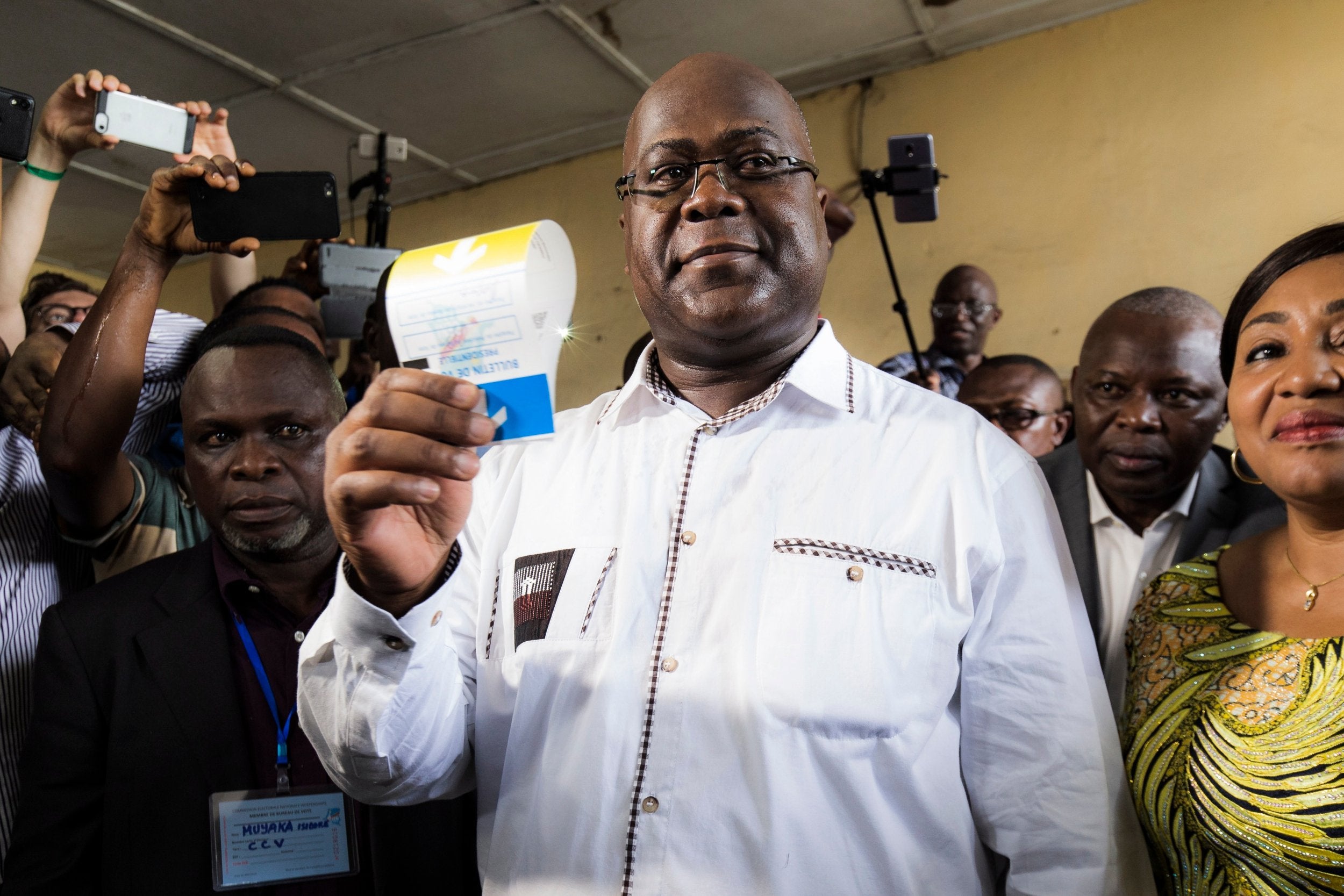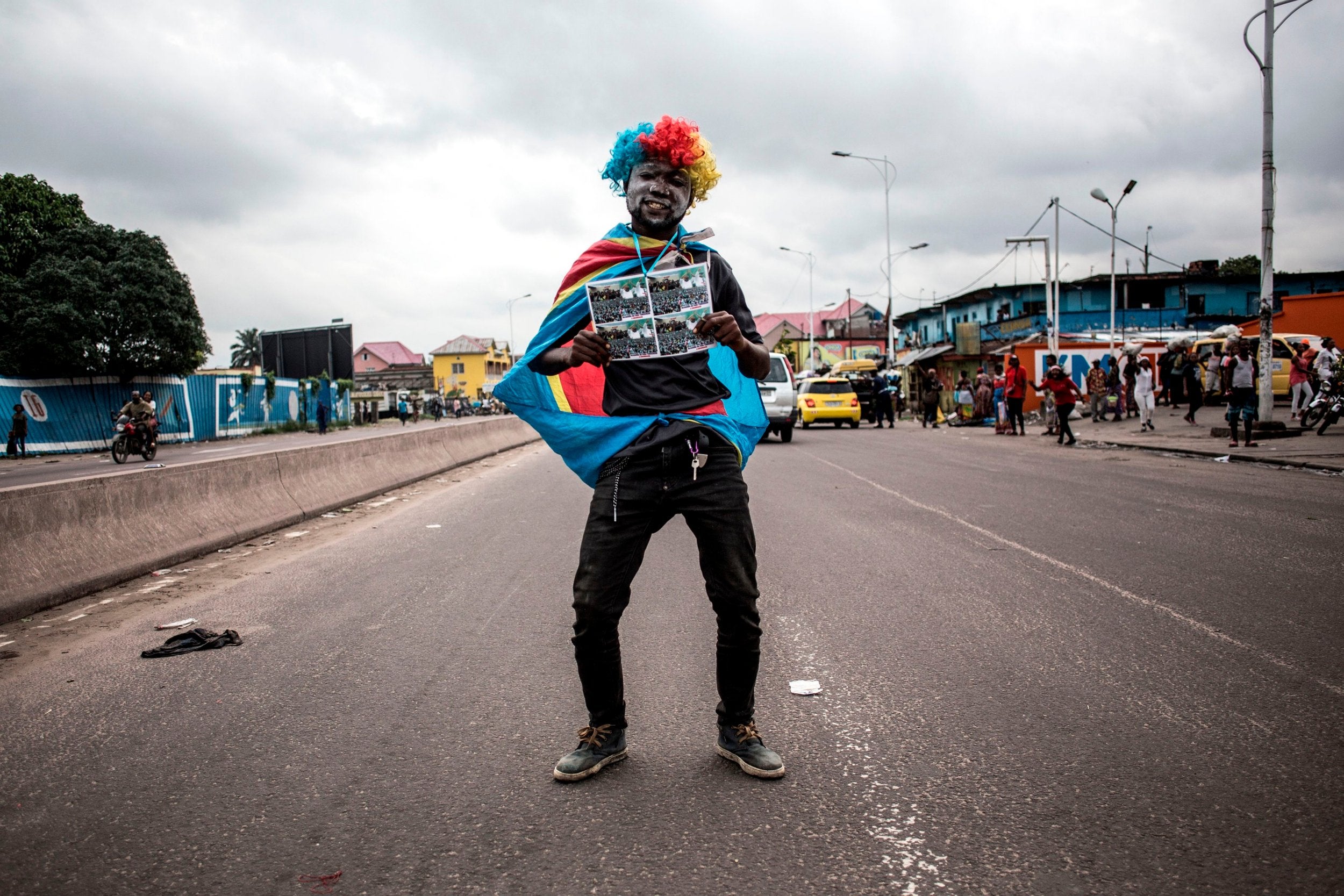Congo presidential election: Political rival denounces vote as ‘rigged’ after opposition candidate wins surprise victory
Anti-corruption candidate says winner made backroom deal with outgoing president Joseph Kabila

Your support helps us to tell the story
From reproductive rights to climate change to Big Tech, The Independent is on the ground when the story is developing. Whether it's investigating the financials of Elon Musk's pro-Trump PAC or producing our latest documentary, 'The A Word', which shines a light on the American women fighting for reproductive rights, we know how important it is to parse out the facts from the messaging.
At such a critical moment in US history, we need reporters on the ground. Your donation allows us to keep sending journalists to speak to both sides of the story.
The Independent is trusted by Americans across the entire political spectrum. And unlike many other quality news outlets, we choose not to lock Americans out of our reporting and analysis with paywalls. We believe quality journalism should be available to everyone, paid for by those who can afford it.
Your support makes all the difference.Joyous dancing erupted in the streets of the Democratic Republic of Congo‘s capital to celebrate the surprise victory of opposition candidate Felix Tshisekedi, who was declared winner of the long-delayed, disorganised and controversial presidential election.
“Today I am happy,” said Mr Tshisekedi. “Happy for you, my base. Happy for the people of Congo. Everyone is celebrating that there is peace. No one could imagine the scenario where an opposition candidate could be victorious!”
However, rival opposition candidate Martin Fayulu claimed the results had been rigged by outgoing president Joseph Kabila who made a backroom deal with Mr Tshisekedi.
Along with diplomats and observers, Mr Fayulu has claimed that Mr Kabila may have negotiated with Mr Tshisekedi to prevent an anti-corruption crusader from winning.
Mr Tshisekedi, who received 38 per cent of the vote according to the electoral commission’s results, had not been widely considered the leading candidate and is relatively untested. Long in the shadow of his father, the now deceased opposition leader Etienne, Mr Tshisekedi startled Congo shortly before the election by breaking away from the unified opposition candidate, Mr Fayulu, to stand on his own.
Mr Fayulu quickly denounced Mr Tshisekedi’s victory as fraud. The results were an “electoral hold-up” that were “rigged, fabricated and invented” and do “not reflect the truth of the ballots”, he said.
Speaking to the press shortly after the results, Mr Fayulu called on the Congolese people to “rise as one man to protect victory”.
Mr Fayulu, a former Exxon manager and Kinshasa politician, received 34 per cent of the vote in the electoral commission’s results. He claims he won a majority of the votes and he was deprived of victory because a deal was made with Mr Tshisekedi.
“How long are we going to negotiate results?” said Mr Fayulu. “In 2006, Jean-Pierre Bemba’s victory was stolen, in 2011 Etienne Tshisekedi’s victory was stolen. In 2018 victory won’t be stolen from Martin Fayulu.”
Mr Fayulu urged the Catholic Church to release the results from its team of 40,000 observers who recorded voting tallies posted at each of the polling centres. Last week, the church said their observations showed a clear winner, and many say that was Mr Fayulu.
Several diplomats briefed on the matter said the figures compiled by the Catholic Church showed Mr Fayulu won an absolute majority of the votes. Two diplomats also said all major observation missions, including from the African Union and the Southern African Development Community, showed similar results with Mr Fayulu the winner. The diplomats spoke on condition of anonymity because they were not authorised to speak to the press.
Mr Kabila’s government made a deal with Mr Tshisekedi to declare him the winner, as hopes faded for ruling party candidate Emmanuel Ramazani Shadary, who received just 23 per cent of the official results. The constitutional court has 14 days to validate the results.
Happy demonstrators in Kinshasa, however, showed no signs of wanting to challenge Mr Tshisekedi’s victory. Many said they were delighted pleased with Mr Tshisekedi’s win and to see Mr Kabila step down.
“This is the coronation of a lifetime,” the deputy secretary-general of Mr Tshisekedi’s party, Rubens Mikindo, said shortly after the announcement that his candidate had won, above the cheers at party headquarters. “This is the beginning of national reconciliation.”
The election may enable Congo to achieve its first peaceful, democratic transfer of power since independence in 1960. Mr Kabila has ruled since 2001 in the troubled nation rich in the minerals key to smartphones around the world and has amassed vast wealth. He is barred from serving three consecutive terms, but during more than two years of election delays many Congolese feared he would find a way to stay in office.
Attention now turns to Congo’s powerful Catholic Church and whether it will dispute the official results.
If the church finds Mr Fayulu won, “how will the population react?” Stephanie Wolters, analyst with the Institute for Security Studies, posted on Twitter. She added: “[Will the African Union] consider a power transfer ‘enough’ or will they push for investigation and real result?”

The delayed results, nearly two weeks after the 30 December vote, came after international pressure to announce an outcome that reflected the will of the people. The United States threatened sanctions against officials who rigged the vote.
The largely peaceful election was marred by the malfunctioning of many voting machines Congo used for the first time. Dozens of polling centres opened hours late as materials went missing. And in a last-minute decision, some 1 million of the country’s 40 million voters were barred from participating, with the electoral commission blaming a deadly Ebola virus outbreak.
Defiantly, tens of thousands of voters in one of the barred communities held their own ballot on election day. Mr Fayulu won easily.
Congo’s government cut internet service the day after the vote to prevent speculation on social media. As the electoral commission met this week, anti-riot police moved into place outside.
Some Congolese, weary of Mr Kabila’s 18-year rule, two turbulent years of election delays and years of conflict that killed millions of people, said they simply wanted peace. Some said they would be happy as long as Mr Fayulu or Mr Tshisekedi won, while recalling the violence that followed past disputed elections.
Many Congolese objected to Mr Shadary, suspecting Mr Kabila would continue to rule from behind the scenes.
Now Congo faces a new leader who is little known after spending many years in Belgium and living in the shadow of his outspoken father.
The 56-year-old Mr Tshisekedi took over as head of Congo’s most prominent opposition party in early 2018, a year after his father’s death.
Associated Press
Join our commenting forum
Join thought-provoking conversations, follow other Independent readers and see their replies
Comments